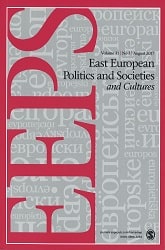Survivor Testimonies and the Coming to Terms with the Holocaust in Volhynia and Eastern Galicia: The Case of the Ukrainian Nationalists
Survivor Testimonies and the Coming to Terms with the Holocaust in Volhynia and Eastern Galicia: The Case of the Ukrainian Nationalists
Author(s): Grzegorz Rossolinski-LiebeSubject(s): Studies in violence and power, Nationalism Studies, WW II and following years (1940 - 1949), Fascism, Nazism and WW II, History of the Holocaust, History of Antisemitism
Published by: SAGE Publications Ltd
Keywords: Holocaust; World War II; Survivor testimonies; historiography; Jewish history;
Summary/Abstract: The question, if and to what extent the Ukrainian nationalists murdered Jews in Volhynia and eastern Galicia during the Holocaust, has haunted Jewish and Ukrainian communities in various countries of the Western world during the entire Cold War. It also puzzled German historians of Eastern Europe and Nazi Germany. Historians, although in theory responsible for investigating and clarifying such difficult aspects of the past, have for various reasons not investigated them or they investigated only other aspects of the Holocaust in Ukraine. This article briefly explains how factions of the Ukrainian diaspora invented a narrative that portrayed Ukrainian nationalists as anti-German and anti-Soviet freedom fighters who did not kill or harm any Jews during the German occupation of Ukraine. In the next step, it shows how testimonies and other sorts of documents left by survivors from Volhynia and eastern Galicia can help historians understand the role that ordinary Ukrainians and the OUN and UPA played in the Shoah in western Ukraine. Finally, it asks why it took Ukrainian, German, Polish, Russian, and other historians so many years to investigate and comprehend the anti-Jewish violence of the Ukrainian nationalists, if relevant documents were collected and made accessible as early as in the middle 1940s.
Journal: East European Politics and Societies
- Issue Year: 34/2020
- Issue No: 01
- Page Range: 221-240
- Page Count: 20
- Language: English
- Content File-PDF

